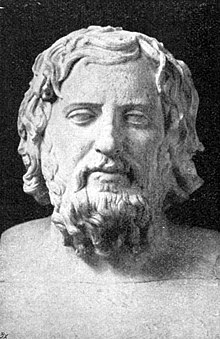Xenophon
Appearance


Xenophon (Greek Ξενοφῶν, c. 431 BC – c. 354 BC) was an Athenian author, historian and mercenary, who led the epic retreat of the Ten Thousand from Mesopotamia to the Black Sea coast. He knew Socrates, Cyrus the Younger and Agesilaus II of Sparta, and wrote about all of them.
- See also: Memorabilia
Quotes
[edit]- It is only for those to employ force who possess strength without judgment; but the well advised will have recourse to other means. Besides, he who pretends to carry his point by force hath need of many associates; but the man who can persuade knows that he is himself sufficient for the purpose; neither can such a one be supposed forward to shed blood; for, who is there would choose to destroy a fellow citizen rather than make a friend of him by mildness and persuasion?
- Memorabilia of Socrates Bk. 1, ch. 2, as translated by Sarah Fielding in The Whole Works of Xenophon (1840), p. 523.
- The most delightful of all music, that of your own praises.
- Hiero, ch. 3, as translated by Richard Graves in The Whole Works of Xenophon (1832) p. 626).
- There is small risk a general will be regarded with contempt by those he leads, if, whatever he may have to preach, he shows himself best able to perform.
- The Cavalry General, ch. 6, as translated by Henry Graham Dakyns in The Cavalry General (2004) p. 26.
- For showing loyalty in the midst of prosperity calls for no particular admiration, but always, if men show themselves steadfast when friends have fallen upon misfortunes, this is remembered for all times.
- Hellenica Bk. 4, as translated by Carleton L. Brownson (1918)
- As to what happened next, it is possible to maintain that the hand of heaven was involved, and also possible to say that when men are desperate no one can stand up to them.
- Hellenica Bk. 7, as translated by Rex Warner in A History of My Times (1979) p. 398.
- Every one of you is the leader.
- Quoted in Edith Hamilton The Greek Way ([1930] 1993) p. 134.
- It is common opinion among us in regard to beauty and wisdom that there is an honourable and a shameful way of bestowing them. For to offer one’s beauty for money to all comers is called prostitution; but we think it virtuous to become friendly with a lover who is known to be a man of honour. So is it with wisdom. Those who offer it to all comers for money are known as sophists, prostitutors of wisdom.
- Words spoken by Socrates to Antiphon in Memorabilia, 1.6.11.
- The company, then, were feasting in silence, as though some one in authority had commanded them to do so, when Philip the buffoon knocked at the door and told the porter to announce who he was and that he desired to be admitted; he added that with regard to food he had come all prepared, in all varieties—to dine on some other person's,—and that his servant was in great distress with the load he carried of—nothing, and with having an empty stomach. Hearing this, Callias said, “Well, gentlemen, we cannot decently begrudge him at the least the shelter of our roof; so let him come in.” With the words he cast a glance at Autolycus, obviously trying to make out what he had thought of the pleasantry. But Philip, standing at the threshold of the men's hall where the banquet was served, announced: “You all know that I am a jester; and so I have come here with a will, thinking it more of a joke to come to your dinner uninvited than to come by invitation.” “Well, then,” said Callias, “take a place; for the guests, though well fed, as you observe, on seriousness, are perhaps rather ill supplied with laughter.”
- Symposium, 1.11-13
Anabasis
[edit]- Most quotations are cited from the 1854 translation of Anabasis by John Selby Watson
- Clearchus spoke, and his words were few; "Conquerors do not, as a rule, give up their arms."
- Bk. 2, ch. 1.
- In this mood he [Proxenus] threw himself into the projects of Cyrus, and in return expected to derive from this essay the reward of a great name, large power, and wide wealth. But for all that he pitched his hopes so high, it was none the less evident that he would refuse to gain any of the ends he set before him wrongfully. Righteously and honourably he would obtain them, if he might, or else forego them.
- Bk. 2, ch. 6; p. 45.
- The thing is to get them to turn their thoughts to what they mean to do, instead of to what they are likely to suffer.
- Bk. 3, ch. 1.
- On making prisoners of our generals, they expected that we should perish from want of direction and order. It is incumbent, therefore, on our present commanders to be far more vigilant than our former ones, and on those under command to be far more orderly, and more obedient to their officers, at present than they were before…On the very day that such resolution is passed, they will see before them ten thousand Clearchuses instead of one.
- Bk. 3, ch. 2; pp. 88-89.
- But if any other course, in any one's opinion, be better than this, let him, even though he be a private soldier, boldly give us his sentiments; for the safety, which we all seek, is a general concern.
- Bk. 3, ch. 2; p. 89.
- θάλαττα! θάλαττα!
- The sea! The sea!
- Bk. 4, ch. 24.
- The sea! The sea!
- Yet is it more honourable, and just, and upright, and pleasing, to treasure in the memory good acts than bad.
- Bk. 5, ch. 8; p. 179.
Cyropaedia, 4th Century BC
[edit]- Just as the various trades are most highly developed in large cities, in the same way food at the palace is prepared in a far superior manner. In small towns the same man makes couches, doors, plows and tables, and often he even builds houses, and still he is thankful if only he can find enough work to support himself. And it is impossible for a man of many trades to do all of them well. In large cities, however, because many make demands on each trade, one alone is enough to support a man, and often less than one: for instance one man makes shoes for men, another for women, there are places even where one man earns a living just by mending shoes, another by cutting them out, another just by sewing the uppers together, while there is another who performs none of these operations but assembles the parts, Of necessity, he who pursues a very specialised task will do it best.
- That ... is the road to the obedience of compulsion. But there is a shorter way to a nobler goal, the obedience of the will. When the interests of mankind are at stake, they will obey with joy the man whom they believe to be wiser than themselves. You may prove this on all sides: you may see how the sick man will beg the doctor to tell him what he ought to do, how a whole ship’s company will listen to the pilot.
- Bk. 1, ch. 6; as translated by Henry Graham Dakyns in Cyropaedia (2004) p. 29.
- If the campaign is in summer the general must show himself greedy for his share of the sun and the heat, and in winter for the cold and the frost, and in all labours for toil and fatigue. This will help to make him beloved of his followers.
- Bk. 1, ch. 6; as translated by Henry Graham Dakyns in Cyropaedia (2004) p. 31.
External links
[edit]Project Gutenberg e-texts:


